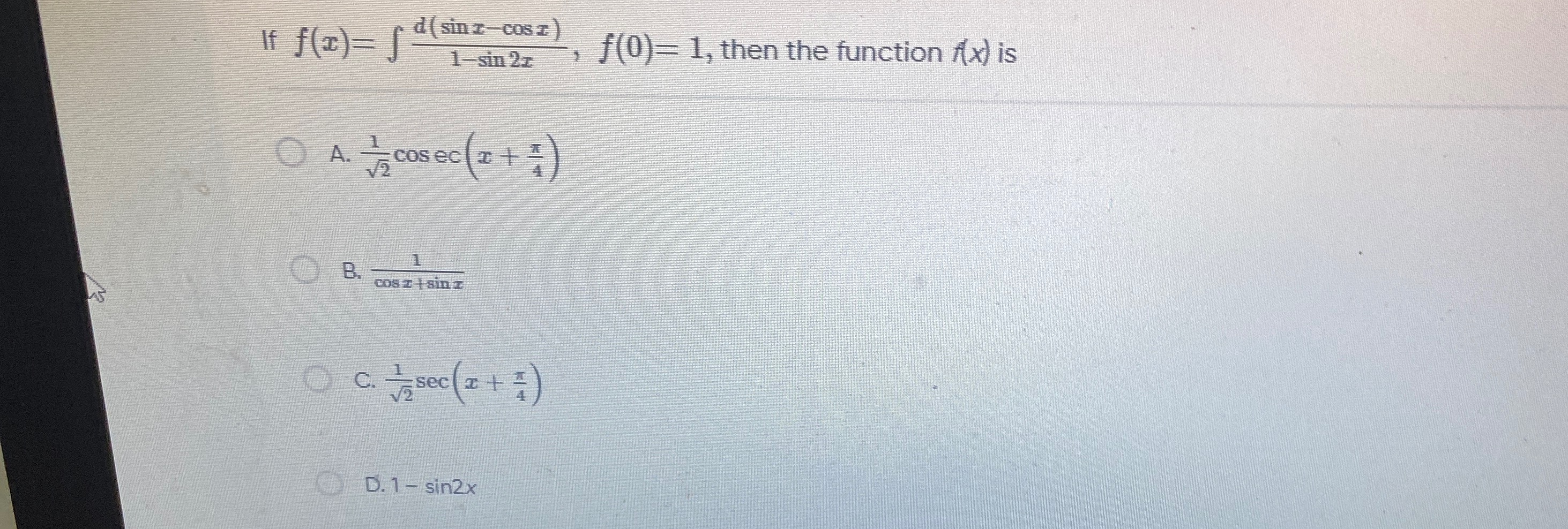Question
Question: If $f(x) = \int \frac{d(\sin x - \cos x)}{1-\sin 2x}, f(0) = 1$, then the function $f(x)$ is...
If f(x)=∫1−sin2xd(sinx−cosx),f(0)=1, then the function f(x) is

21cosec(x+4π)
cosx+sinx1
21sec(x+4π)
1−sin2x
21sec(x+4π)
Solution
The problem asks us to find the function f(x) given its integral form and an initial condition.
1. Simplify the integrand: The given integral is f(x)=∫1−sin2xd(sinx−cosx).
First, let's analyze the numerator: d(sinx−cosx)=(dxd(sinx−cosx))dx=(cosx−(−sinx))dx=(cosx+sinx)dx.
Next, let's simplify the denominator using trigonometric identities: We know that 1=sin2x+cos2x and sin2x=2sinxcosx. So, 1−sin2x=sin2x+cos2x−2sinxcosx. This is the expansion of a perfect square: (sinx−cosx)2. Thus, 1−sin2x=(sinx−cosx)2.
Substituting these simplified forms back into the integral, we get: f(x)=∫(sinx−cosx)2(cosx+sinx)dx.
2. Perform substitution to solve the integral: Let u=sinx−cosx. Then, the differential du=(cosx+sinx)dx.
Substituting u and du into the integral: f(x)=∫u2du=∫u−2du.
Now, integrate u−2 with respect to u: f(x)=−2+1u−2+1+C=−1u−1+C=−u1+C.
Substitute back u=sinx−cosx: f(x)=−sinx−cosx1+C=cosx−sinx1+C.
3. Use the initial condition to find the constant of integration (C): We are given that f(0)=1. Substitute x=0 into the expression for f(x): f(0)=cos0−sin01+C. We know that cos0=1 and sin0=0. So, f(0)=1−01+C=1+C.
Given f(0)=1, we have: 1+C=1 This implies C=0.
Therefore, the function f(x) is: f(x)=cosx−sinx1.
4. Compare with the given options: Let's simplify each option to see which one matches our derived f(x).
-
A. 21csc(x+4π) csc(x+4π)=sin(x+4π)1. Using the sine addition formula sin(A+B)=sinAcosB+cosAsinB: sin(x+4π)=sinxcos4π+cosxsin4π=sinx⋅21+cosx⋅21=21(sinx+cosx). So, Option A becomes 2⋅21(sinx+cosx)1=sinx+cosx1. This does not match f(x).
-
B. cosx+sinx1 This is the same as the simplified form of Option A, so it does not match f(x).
-
C. 21sec(x+4π) sec(x+4π)=cos(x+4π)1. Using the cosine addition formula cos(A+B)=cosAcosB−sinAsinB: cos(x+4π)=cosxcos4π−sinxsin4π=cosx⋅21−sinx⋅21=21(cosx−sinx). So, Option C becomes 2⋅21(cosx−sinx)1=cosx−sinx1. This matches our derived f(x).
-
D. 1−sin2x This is clearly not f(x).
Thus, option C is the correct answer.
